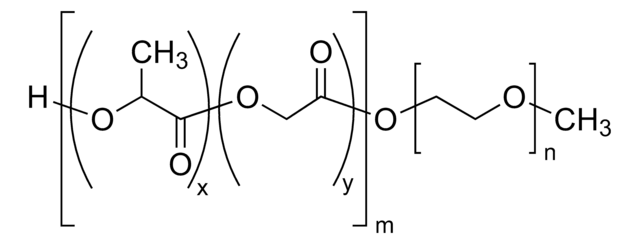908843
Poly(lactide-co-glycolide)-b-poly(ethylene glycol)-b-poly(lactide-co-glycolide)
average Mn (1,600-1,500-1,600), lactide:glycolide 75:25
Sinónimos:
PLGA-PEG-PLGA
About This Item
Productos recomendados
form
semisolid
feed ratio
lactide:glycolide 75:25
mol wt
PEG average Mn 1,500 (by NMR)
PLGA average Mn 3,200 (by NMR)
average Mn (1,600-1,500-1,600)
color
white to tan
PDI
≤2.0
<1.1 (Typical PEG PDI )
storage temp.
−20°C
¿Está buscando productos similares? Visita Guía de comparación de productos
Application
Storage Class
10 - Combustible liquids
wgk_germany
nwg
flash_point_f
Not applicable
flash_point_c
Not applicable
Certificados de análisis (COA)
Busque Certificados de análisis (COA) introduciendo el número de lote del producto. Los números de lote se encuentran en la etiqueta del producto después de las palabras «Lot» o «Batch»
¿Ya tiene este producto?
Encuentre la documentación para los productos que ha comprado recientemente en la Biblioteca de documentos.
Nuestro equipo de científicos tiene experiencia en todas las áreas de investigación: Ciencias de la vida, Ciencia de los materiales, Síntesis química, Cromatografía, Analítica y muchas otras.
Póngase en contacto con el Servicio técnico








